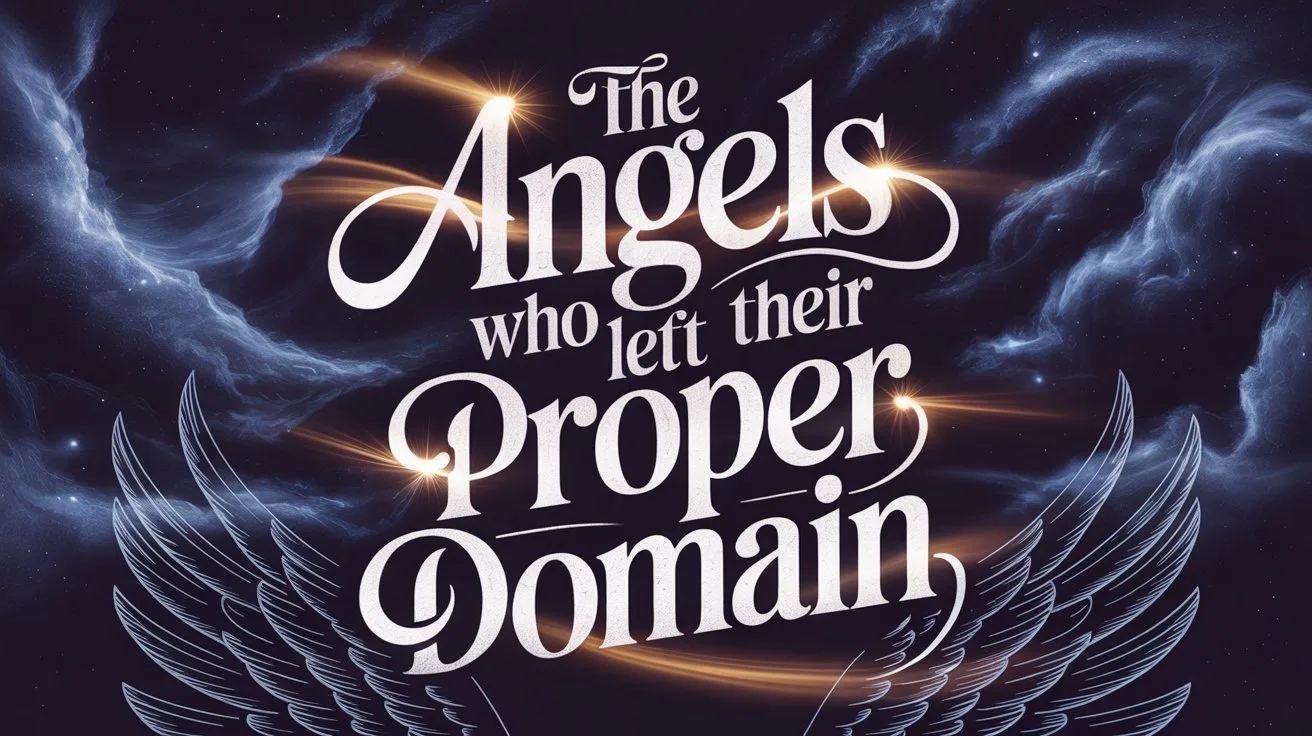Jude speaks clearly of a group of angels whose rebellion was distinct from Satan’s general revolt.
“And the angels who did not keep their proper domain, but left their own abode, He has reserved in everlasting chains under darkness for the judgment of the great day;”
(Jude 1:6)
The phrase “proper domain” comes from the Greek archē, meaning a principality or sphere of authority. This wasn’t just rebellion in thought, this was a willful departure from God’s assigned structure for spiritual beings. They “left their own abode” (oikētērion), which refers to their heavenly habitation. That same word appears in 2 Corinthians 5:2 to speak of the glorified body that believers will one day receive. These angels forsook the spiritual realm to invade the earthly.
This connects directly to the incident described in Genesis 6:
“Now it came to pass, when men began to multiply on the face of the earth, and daughters were born to them, that the sons of God saw the daughters of men, that they were beautiful; and they took wives for themselves of all whom they chose.”
(Genesis 6:1–2)
The phrase “sons of God” (bene ha’elohim) consistently refers to angelic beings elsewhere in the Old Testament (Job 1:6, Job 2:1, Job 38:7). The early Church, as well as Jewish tradition preserved in texts like 1 Enoch, understood these as fallen angels who took human wives, transgressing their heavenly nature to commit unnatural union. This is confirmed by Jude’s very next verse:
“As gomorrah/”>Sodom and Gomorrah, and the cities around them in a similar manner to these, having given themselves over to sexual immorality and gone after strange flesh, are set forth as an example, suffering the vengeance of eternal fire.”
(Jude 1:7)
When Jude says they “went after strange flesh,” the phrase in Greek is sarkos heteras, literally “flesh of another kind.” This word heteras means “of a different nature, class, or kind,” not simply different in behavior but different in species or order. This is crucial. Jude is not merely pointing to sexual sin, Sodom was guilty of many forms of wickedness (Ezekiel 16:49–50), but he emphasizes this particular sin to draw a direct line to the angels’ sin in verse 6.
Homosexuality, while sinful (Romans 1:26–27, 1 Corinthians 6:9–10), is still a sin committed between beings of the same kind, man with man. But the sin of the angels was of an entirely different magnitude: angelic beings uniting with human women. That’s not just immorality, it’s crossing a divine line between creation orders. This is the very heart of “strange flesh”: it is unnatural in kind, a transgression of the divine boundaries set by God at creation (Genesis 1:11–25, each “after its kind”).
This interpretation is strengthened by the parallel Jude draws between the angels and Sodom, using both to highlight the severity of violating God’s created order.
The result of the Genesis 6 union was catastrophic:
“There were giants on the earth in those days, and also afterward, when the sons of God came in to the daughters of men and they bore children to them. Those were the mighty men who were of old, men of renown.”
(Genesis 6:4)
These “giants” are the Nephilim, a hybrid race that corrupted the genetic and moral landscape of mankind. This act was so grievous that it helped trigger the flood:
“Then the Lord saw that the wickedness of man was great in the earth… And the Lord was sorry that He had made man on the earth, and He was grieved in His heart.”
(Genesis 6:5–6)
2 Peter also corroborates Jude’s account:
“For if God did not spare the angels who sinned, but cast them down to hell and delivered them into chains of darkness, to be reserved for judgment;”
(2 Peter 2:4)
The word translated as Hell in this passage, Peter actually uses Tartarus, not Gehenna or Hades, to describe where these angels were cast. In Greek thought, Tartarus was the lowest abyss of the underworld, a place reserved for the most serious offenders. Peter applies this word to a real and terrifying prison.
Their chains are described as “everlasting” and their prison “under darkness.” This echoes another prophetic warning:
“It shall come to pass in that day that the Lord will punish on high the host of exalted ones, and on the earth the kings of the earth. They will be gathered together, as prisoners are gathered in the pit, and will be shut up in the prison; after many days they will be punished.”
(Isaiah 24:21–22)
Paul likely had this order of rebellion in mind when he exhorted godly behavior in worship:
“For this reason the woman ought to have a symbol of authority on her head, because of the angels.”
(1 Corinthians 11:10)
Even head coverings are linked to submission and the warning of what happens when spiritual beings abandon order.
Finally, in his first letter, Peter speaks also of these imprisoned spirits:
“By whom also He went and preached to the spirits in prison, who formerly were disobedient, when once the Divine longsuffering waited in the days of Noah…”
(1 Peter 3:19–20)
Notice how Peter connects the spirits who are imprisoned with the days of Noah. These are not the souls of the damned, but “spirits”, a term used for supernatural beings. They were active during the time of Noah and now await final judgment.
A Place Reserved and Not Forgotten
Going back to Jude 1:6, the phrase “reserved in everlasting chains under darkness” reveals several key truths:
“…He has reserved in everlasting chains under darkness for the judgment of the great day.” (Jude 1:6)
This place is everlasting in its restraint, yet it is not the final judgment. The “great day” refers to the final reckoning, The Day of the Lord Revelation 20:11–15, when the dead, both great and small, are judged before God. These fallen angels are not roaming freely. Unlike demons who still possess and influence, these are locked away until their appointed judgment.
This imprisonment affirms God’s absolute authority over both spiritual and physical realms.
“The Lord knows how to deliver the godly out of temptations and to reserve the unjust under punishment for the day of judgment.” (2 Peter 2:9)
Only certain angels received this punishment. This suggests a unique offense, again, pointing back to Genesis 6. Their sin was not just rebellion, but trespassing the boundaries of creation itself.
Spiritual Implications
Understanding that some demons are bound shows us that God draws lines that no rebellion can cross without consequence. This gives us perspective in spiritual warfare. The demonic activity we see today is not from these beings, they are chained, but there remains other fallen angels and demons who operate under Satan’s domain (Ephesians 6:12).
However, even they operate under the Lord’s constraint. Jesus exercised complete authority over them:
“And He permitted them.” (Mark 5:13)
The same Christ who has authority over the demons that roam is the One who commanded those so rebellious that they were locked in darkness before the flood.
My Final Thoughts
Some angels sinned so severely that they were cast into Tartarus, a prison beneath even Hades, reserved for judgment. This is not mythology, it is inspired truth, revealed by both Jude and Peter under the Spirit’s inspiration. Their judgment was swift, just, and irreversible.
And it serves as a warning. God does not overlook rebellion, whether celestial or terrestrial. But for the righteous, this also reassures us. If God knows how to deal with even the most powerful rebels, He certainly knows how to preserve His saints.
In the end, He will judge angels (1 Corinthians 6:3), and every enemy will be brought under His feet. Until that day, we walk in holy fear, not of demons, but of the One who judges rightly.





 Get the book that teaches you how to evangelize and disarm doctrines from every single major cult group today.
Get the book that teaches you how to evangelize and disarm doctrines from every single major cult group today.